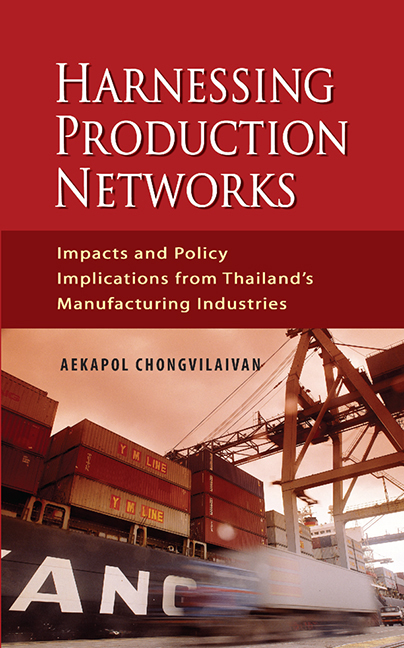 Harnessing Production Networks
Harnessing Production Networks Published online by Cambridge University Press: 21 October 2015
Introduction
Much research has been devoted to attempts to empirically investigate the extent to which disintegrating production affects an economy. These include the effects on firm performance, factor productivity and labour markets. In these studies, the notion of production fragmentation has to do with the aggregate uses of materials and services inputs. However, recent developments witnessed a growing amount of evidence showing that there are different economic effects pertinent to contracting out of different types of intermediate inputs. This implies that a more refined treatment of outsourcing activities is indispensable for obtaining more accurate empirical results.
The role of outsourcing typology is not new. Several studies in various economies have pushed forward different types of outsourcing activities that exert different economic effects. There are at least three main approaches prevalently employed in the literature to take in heterogeneous effects of outsourcing typology.
Firstly, the nature of outsourced inputs (tangibles or services) is perhaps the most commonly utilized approach to separation of outsourcing types. A number of recent studies showed evidence that outsourced materials and services matter to the underlying economic impacts in contrasting ways. Görg and Hanley (2005), for instance, empirically examined a relationship between outsourcing activities and firm-level productivity using the firm-level data for the electronics industry in Ireland. They found that materials outsourcing contributes to total factor productivity growth whereas there is no such positive effect observed for services outsourcing. Using the same Irish dataset, Görg et al. (2008) attempted to control for firm-level heterogeneity and further revealed that potential productivity improvements from outsourcing of services inputs accrue only to exporters. Likewise, Amiti and Wei (2009) investigated productivity effects of international outsourcing of materials and services inputs in the United States (U.S.) manufacturing industries. They found rather contrasting evidence that outsourcing of both materials and services inputs rendered positive effects on productivity and accounted for around 10 and 5 per cent of observed productivity growth, respectively, in the period of 1992–2000. Their robustness checks further indicated that productivity gains from services outsourcing are robust across all specifications, but those from materials outsourcing are not.
To save this book to your Kindle, first ensure [email protected] is added to your Approved Personal Document E-mail List under your Personal Document Settings on the Manage Your Content and Devices page of your Amazon account. Then enter the ‘name’ part of your Kindle email address below. Find out more about saving to your Kindle.
Note you can select to save to either the @free.kindle.com or @kindle.com variations. ‘@free.kindle.com’ emails are free but can only be saved to your device when it is connected to wi-fi. ‘@kindle.com’ emails can be delivered even when you are not connected to wi-fi, but note that service fees apply.
Find out more about the Kindle Personal Document Service.
To save content items to your account, please confirm that you agree to abide by our usage policies. If this is the first time you use this feature, you will be asked to authorise Cambridge Core to connect with your account. Find out more about saving content to Dropbox.
To save content items to your account, please confirm that you agree to abide by our usage policies. If this is the first time you use this feature, you will be asked to authorise Cambridge Core to connect with your account. Find out more about saving content to Google Drive.